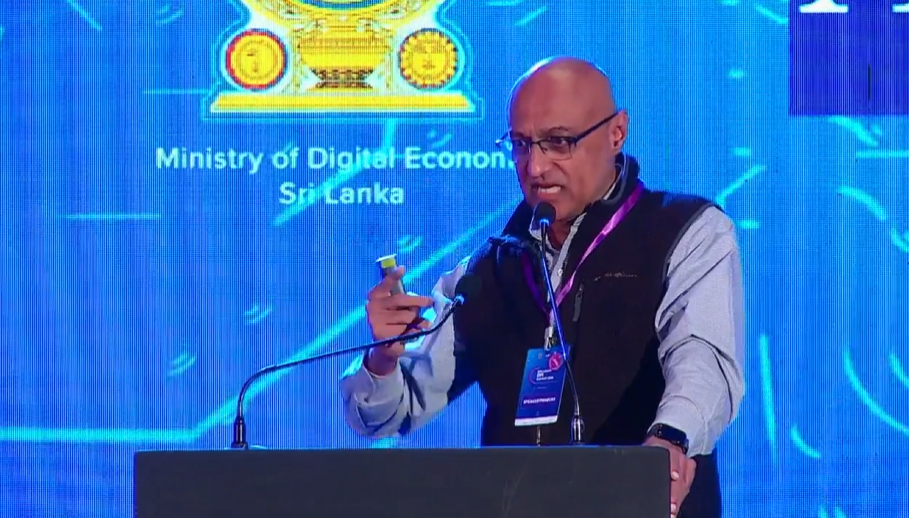DPI systems can just as easily exclude people from participating in some aspects of society just as much as they’re said to include them: perspective
One of India’s digital identity architects tells the Sri Lanka DPI Summit that Digital Public Infrastructure allows governments to track individual finances and is good for vaccine passports.
By now, you’ve probably heard of a digital wallet, but that concept is being expanded to a digital locker that can store even more personal information for public and private entities to access.

Giving the keynote address at the Sri Lanka DPI [Digital Public Infrastructure] Summit today, Aadhaar founder CTO Srikanth Nadhamuni touted India’s “DigiLocker” as an example for other nations to follow.
DPI consists of three components:
- Digital identity
- Fast payment systems
- Massive data exchanges
In India, records and credentials are now being stored in a digital locker.
With the DigiLocker, there have been “five point two billion digitally verified records in India. One hundred and fifty million people are using these lockers,” said Nadhamuni while listing the various types of records that were stored in these digital lockers.
These records and credentials included digital ID cards, educational records, caste certificates, and vaccine passports, the latter of which Nadhamuni said were “super important.”
“COVID-19, India did some two billion COVID vaccinations, and you had to just carry your digital certificate to the plane. Often they’d look at your QR code and say you’re good, but if they actually verified it, they’d see that it had been signed by the government of India. It can’t be a fake certificate. Super important”
Srikanth Nadhamuni, Sri Lanka DPI Summit, February 2025
There was never any scientific basis to issue or demand vaccine passports like the ones the Aadhaar founder was boasting about.
In fact, the COVID-19 “vaccines” from Pfizer were never tested for transmissibility, and the World Health Organization (WHO) even warned in August 2021 that vaccines passports “may increase the risk of disease spread” because “the extent to which each vaccine prevents transmission of SARS-CoV-2 to susceptible individuals remains to be assessed.”
A person who was fully vaccinated and boosted to the max was just as likely to spread COVID as the person who didn’t receive a single jab — that is if you believe the ever-changing official narratives — like the importance of social distancing, which was another made-up rule that had no scientific basis.
So, what else is a DPI DigiLocker good for?
According to Nadhamuni, forcing citizens to link their digital identity to the tax authorities “allowed the government to better track individuals’ financial activities.”
Tracking an individual’s financial activities is said to reduce tax evasion, which has been a historical problem in India, but it also means the government knows everything about your buying, selling, and saving habits.
With a Central Bank Digital Currency (CBDC) called the e-rupee or digital rupee on the way in India, the government would theoretically be able to automatically tax a citizen by seizing the money straight from their digital wallet, on top of other programmable features, such as setting expiry dates on the CBDC itself.
“Mandatory linking of Aadhaar [digital ID system] and PAN [income tax system] allowed the government to better track individuals’ financial activities”
Srikanth Nadhamuni, Sri Lanka DPI Summit [slide], February 2025

For Nadhamuni, equal access is a key feature of DPI, and by that he means you don’t have to be literate to participate in the system thanks to advances in generative AI.
“Today, with Generative AI […] it’s quite amazing what they can do. An illiterate person who might find it difficult to do banking can do banking by talking to a conversational interface,” said the Aadhaar CTO.
“A poor person from a village can talk to the government through conversational interfaces and ask questions and see what kinds of benefits they can avail,” he added.
What’s more important than teaching people how to read? Getting illiterate people to interact with banks through AI chatbots!
This is one example of what World Economic Forum (WEF) founder Klaus Schwab is calling “The Intelligent Age,” where machines get smarter and humans get dumber.
“The Intelligent Age is fundamentally altering how we communicate — both with one another and with the world around us,” wrote Schwab in a blog post last year.
“AI-driven platforms are already beginning to mediate much of our communication, whether through social media algorithms that decide what content we see or virtual assistants who manage our schedules and interactions,” he added.
Translation services and conversational interfaces for people who don’t know how to read and write can be very useful tools, but at the same time, they’re not incentivizing the illiterate to become literate.
“When vaccination had to happen, the government built a COVID platform, which allowed India to have 2.5 billion vaccinations in two years […] You got a vaccination certificate in real-time, and you could show it anywhere you went in India or abroad […] Digital technology and DPI have been fundamental to India’s development”
Nandan Nilekani, B20 India Summit, August 2023
Nadhumani’s words at the Sri Lanka DPI Summit echo those of another Aadhaar architect, Nandan Nilekani, who told the B20 India Summit in 2023 that India’s DPI stack was great for setting up vaccine passports, collecting taxes, automatic toll payments, climate adaption, and the circular economy.
Previously, Nilekani told the International Monetary Fund (IMF) that the “tools of the new world” were that everyone had to have a digital ID, a smartphone, and a bank account, and that everything else was built upon that.
The Sri Lanka DPI Summit runs from February 5-6.
While there are many benefits to DPI, such as the seamless sharing of credentials and records and fast payments, these digital systems can just as easily exclude people from participating in basic aspects of society just as much as they’re said to include them.
Image Source: Screenshot of Srikanth Nadhamuni at the Sri Lanka DPI Summit, February 5, 2025












